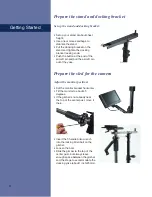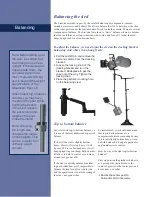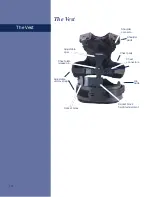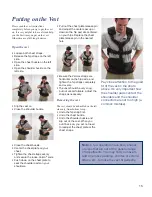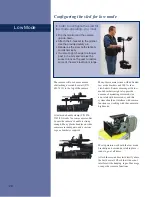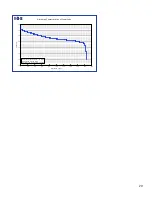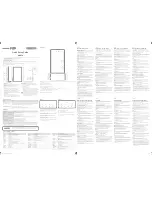
19
• If the sled wants to move away
from you, loosen the bottom in-out
screw and dial in the upper screw
a few turns. Snug up the lower
screw and re-test.
• If the sled wants to move towards
you, loosen the upper in-out screw
a few turns, snug up the lower
screw, and re-test.
• Do not get too fussy with your
threads at this point, as much of
the trick is learning to properly
stand and move, rather than
adjusting your threads.
• Take a few steps and experiment
with the feel of it all. Try panning
and tilting. Before you get tired,
dock the sled.
Test your threads
• Stand as upright as possible, in
good posture, with the rig off your
left hip. Don’t be stiff or tense. Do
not ever let go of the Steadicam
completely, but let it move a little.
• If it tends to stay in place, try
moving it further out in front of you.
Lean back a little as you feel the
vest pushing against your stomach
and pulling your torso forward. The
trick is to lean a little bit away from
the rig – more if it’s further from
you, less as it’s closer to you – so
that the sled wants to stay in place
or float next to you.
• If the sled wants to move off in
one direction rather dramatically
and you can’t lean forward or back
easily to correct it, you need to
adjust your threads. Typically it’s a
matter of the “in-out” screws rather
than the side-to-side screws.
Holding the Steadicam might feel awkward at first. Don’t
worry – you will gain control and endurance rapidly as
you practice. The first time is typically the most annoying,
because there are so many adjustments to make before
it all falls into place and “magically” works with you. It
may be that you will want to adjust the lift capacity of the
arm (see pages 20-21) before fine-tuning your threads.
Eventually you must adjust them both.
Practice replacing the sled in
the docking bracket
• Step up next to the docking stand
with the camera aimed to the left.
• Insert the center post in the
bracket and rest the stage on the
docking yoke.
• Insert the aircraft pin back in the
docking yoke to secure the sled
• Bow from the waist and step back
• Move your left hand to the gimbal
handle, and your right hand to the
arm.
• Hold up the gimbal handle and
let the arm post slide out of the
gimbal mounting hole. Don’t force
it or bend your knees; just find the
correct angle so that the arm post
slips out of the gimbal.
• Always keep a hand on the free
end of the arm, otherwise it might
swing around and hit something.
• Rest. Stretch.
• When you don’t have time to dock
and undock, you can relieve some
muscle tension by holding the rig
close to your body on either side
or clasping the camera close to
your chest.
4
5
6
7
8
9




